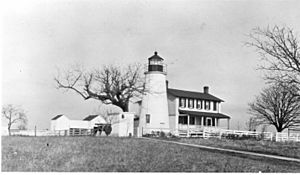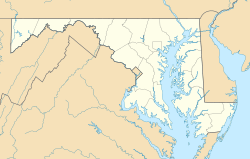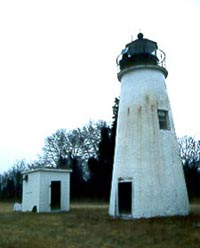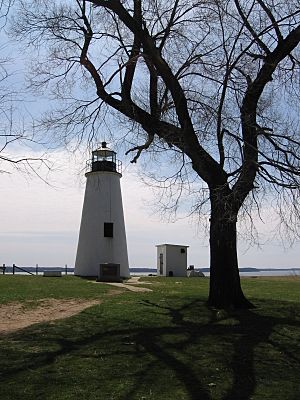Turkey Point Light facts for kids
 |
|
| Taken before 1972 when the house was razed. | |
|
|
|
| Location | Elk Neck State Park at the head of the Chesapeake Bay |
|---|---|
| Coordinates | 39°26′59.578″N 76°0′30.313″W / 39.44988278°N 76.00842028°W |
| Year first constructed | 1833 |
| Year first lit | 1835 |
| Automated | 1947 |
| Deactivated | 2000-2002 |
| Construction | brick/masonry |
| Tower shape | conical tower |
| Markings / pattern | White with black lantern |
| Height | 35 feet (11 m) |
| Focal height | 129 feet (39 m) |
| Original lens | fourth-order Fresnel lens, 1855 |
| Characteristic | Flashing white 6 sec |
| Fog signal | none |
| Admiralty number | J2344 |
| ARLHS number | USA-857 |
| USCG number | 2-8975 |
The Turkey Point Light is an old and important lighthouse located at the top of the Chesapeake Bay. Even though the tower itself is only 35-foot (11 m) tall, it sits on cliffs that are 100-foot (30 m) high. This makes it the third tallest light above the water in the whole bay!
This lighthouse is also famous because many women worked as lightkeepers there. Four out of the ten known keepers were women. They worked for 89 years out of the 115 years the light had staff.
Contents
Building the Turkey Point Light
In early 1833, the United States Congress approved $5,000 to build this lighthouse. A builder named John Donahoo constructed it, and it was finished in July 1833. He used a similar design to one he had used for the Concord Point Light. There was a small delay in buying the land because of a disagreement about its value.
How the Light Worked
When it was first built, the lighthouse used eleven wicks and reflectors to create its light. In 1855, this was changed to a new, more advanced Fresnel lens with just one lamp. The lantern, which is the top part of the lighthouse where the light shines from, was improved in 1867 to fit the new lens better.
Over the years, the lighting system was updated several times. In 1942, the lighthouse was connected to electricity. When the light became automated in 1947, meaning it could run by itself, Fannie Salter retired. She was the last woman lighthouse keeper in the United States.
Keeper's House and Fog Bell
Along with the tower, John Donahoo also built a house for the lighthouse keeper. It was originally a single-story building, but in 1889, a second story was added.
The site also had a special fog bell enclosure, built in 1888. Because the lighthouse stood on such a high cliff, they decided to place the bell as low as possible. To make room for the heavy weights that made the bell ring, a thirty-foot deep well was dug, and the enclosure was built over it. During World War II, a watchtower was placed on top of the bell enclosure.
Changes Over Time
After the lighthouse became automated, its remote location made it a target for vandals. One time, someone broke into the tower and stole the lens! Because of this, a large part of the wooden spiral staircase inside was removed, and the entrance was sealed with a strong steel door. The keeper's house slowly fell apart and was torn down in 1972.
On December 2, 2002, the Turkey Point Light was added to the National Register of Historic Places. This means it is recognized as an important historical site.
The Lighthouse Today
In 2000, the lighthouse was officially taken out of service. It was then leased to a non-profit group called Turkey Point Light Station (TPLS) Inc. This group took over caring for the lighthouse. In 2002, they turned the light back on, and it now serves as a private aid to navigation.
The TPLS group also replaced the steel ladder inside the lighthouse with a new wooden spiral staircase. On weekends, volunteers give tours of the lighthouse, and you can even walk to the very top!
In 2006, the Coast Guard officially gave ownership of the lighthouse to the state of Maryland. Maryland then renewed the lease to TPLS. The land around the lighthouse is now part of Elk Neck State Park, a great place to visit.
To learn more about how people lived and worked on the water nearby, you can visit the Upper Bay Museum in the North East Community Park.
- Turkey Point Light Station, Cecil County, including photo from 1999, at Maryland Historical Trust
 | Victor J. Glover |
 | Yvonne Cagle |
 | Jeanette Epps |
 | Bernard A. Harris Jr. |





